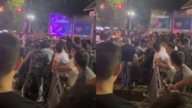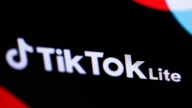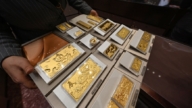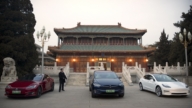【新唐人2011年3月16日訊】趕在三‧一五「國際消費者維權日」之前,廣東消委會公布了2010十大維權典型案例,涵蓋了房產證、快遞、美容、農資商品等等。不過民眾批評黑心商品隨處可見,其實就是因為政府部門失職、監督不力。
廣東省消委會公布的消費維權十大案例,分別是:逾期辦理房產證案、劣質複合肥致香蕉減產案、快遞損壞物件賠償案、越南黃花梨冒充海南黃花梨案、宣傳失誤糾紛案、摩託車自燃糾紛案、小孩遊樂場碰傷案、美容院強行推銷案、石材貨不對板糾紛案和啤酒瓶自爆案。其中,最經典的案例要屬「美容院強行解開女顧客內衣理療案」了。
湖北劉玉傑(實驗農科院職工):「尤其是這些化妝品!我總覺得現在就是把女人的這張臉當成實驗田,還是一些『質檢部門』的問題。主要是允許搞七個許可證就可以生產,然後出來的產品又沒人監督,一旦出了問題,最終還是消費者倒霉。我覺得這還是政府的監督職能問題。」
從各省公布的消費維權案例,可以看到中國黑心產品的氾濫程度。據報導,重慶市去年查獲商販銷售過期大白兔奶糖、南岸區兩間幼稚園買入二百多張未經消毒的黑心棉被。山東青島則有 商人用臭黃花魚製成魚乾。
濟南龔磊(維權人士):「我到上海,我買的水晶拿到濟南來說是…用甚麼呢?用水晶粉重新作的。翡翠也是!好多假石…都那樣做。社會呈現…從制度上各方面,跟政治生活有關。但是幾十年了兌現(為人民服務)不了,你不是整個都是謊言嗎?」
去年6月13號,潮州市也發生了一起令消費者跳腳的糾紛案件,人壽保險的鶴卡會員接到保險公司的簡訊通知:憑鶴卡、邀請函或短信參加蘇寧潮州奎元店舉辦團購活動,可以獲得三百元現金劵及多重好禮。接到短信的幾百個人來到店裡,才知道要購買三千元的東西才能兌現。消費者認為受騙了,差點引起群體事件。
北京王女士(市民):「原來投訴過,後來我就…就是到三‧一五打假日,老百姓為了保護自己的合法權益,因為本來工資就不高,再買個可信的東西,可是就是假的,你說吧,心裡就不舒服!投訴的結果,有時候滿意,有時候就不滿意。不可能事事都讓你滿意,你要滿意的話,他們就不滿意了。」
上個月美國貿易代表辦公室,也發表了所謂「惡名市場」名單,這個名單包括幾家中國企業,其中有網際網路搜索引擎百度、北京的秀水街市場以及「阿里巴巴」和「淘寶」網等商業網站。
新唐人記者常春、李庭、黃容綜合報導。
Unethical Companies Exposed
Right before the World Consumer Rights Day,
Guangdong Consumer Rights Commission
released the 2010 top ten classic consumer rights
cases, concerning real estate ownership certificates,
courier services, agricultural products and more.
Although some cases finally settled,
others escalated into lawsuits. Experts advise
people to choose trustworthy businesses.
Guangdong Consumer Rights Commission
announced on March 10 its top ten consumer
rights cases, including the delayed processing
of real estate ownership certificates;
poor fertilizer production, reducing banana yield;
compensation of property, damaged by courier;
the pears』 case; the publicity dispute mistakes;
the motorcycle self-ignition dispute;
children』s playground injuries;
beauty salons』 forceful sales;
damaged stoneware; and the
beer bottle self-explosion case.
Liu Yujie, staff at Experimental Agricultural Academy:
“Especially these cosmetics! Women』s faces
have become experimenting fields! This is
an issue of quality inspection departments. They
allow firms to produce, without being inspected.
If there is a quality issue, it is consumers』 bad luck.
I think the problem lies with governmental oversight.”
The consumer rights cases across China reflect that
inferior-quality products are rampant. In 2010, there
were sales of expired creamy candy, unsterilized
quilts and inedible dried fish (yellow croaker).
Jinan-based rights activist, Gong Lei:
“The crystal I bought was made with crystal powder.
And emeralds, too! Many fake stones are made
that way. Many societal aspects are related to
the political life. After promising to “serve the people”
for decades, isn』t the whole thing you said a lie?”
In June 2010, an edgy dispute occurred in
Chaozhou City. Some members of a life insurance
company were invited to participate in group
purchases in a store and receive cash coupons
of RMB 300 and other gifts. After a few hundred
people came into the store, they were told to make
purchases of RMB 3,000 first. Feeling deceived,
the shoppers almost started an incident.
Beijing citizen, Ms. Wang: “I initially complained.
Now is March 15, “No Fake Goods Day” in China.
The people want to protect their legal rights
and interests. Their wages are not a lot
to begin with. Buying fake goods makes you
feel uncomfortable! Your complaints sometimes
lead to dissatisfaction. If you are satisfied
all the time, they wouldn』t be happy.”
According to Voice of America, last month
U.S. Trade Representative’s office issued a list of
“notorious markets", including several
Chinese companies. They include
internet search engine Baidu and commercial
websites like alibaba.com and Taobao.com.
NTD reporters Chang Chun ,Li Ting and Huang Rong



























